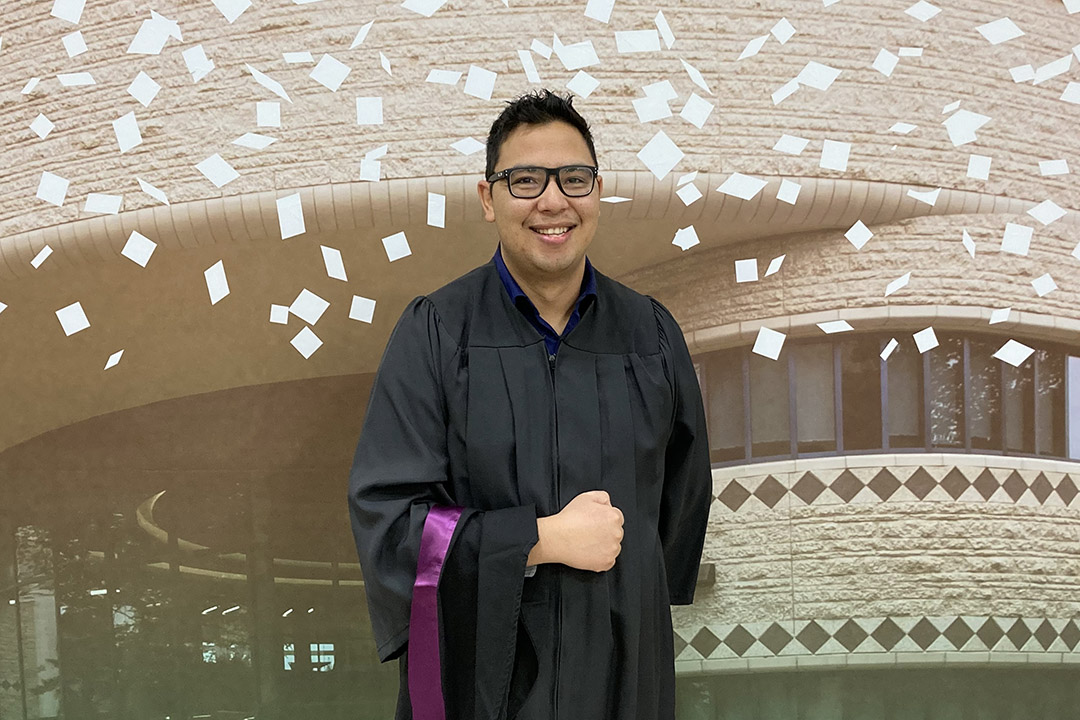
ITEP graduate inspiring youth through land-based and outdoor education
Hailing from Beardy’s and Okemasis Cree Nation, recent Indian Teacher Education Program (ITEP) graduate Tim Roy is passing on what he learned during his time at the University of Saskatchewan’s (USask) College of Education to the next generation at kihiw waciston School.
By Connor JayRoy teaches at kihiw waciston School located on Muskeg Lake Cree Nation. The school focuses on the development of the whole child and offers Cree language and culture instruction, invites Elders to the school to share their knowledge and experiences, and involves students in cultural events.
Roy will celebrate USask Fall Convocation with his fellow ITEP graduates on November 9, 2022, at Merlis Belsher Place.
Q: Please tell us about your current role.
A: Right now, I’m currently working as a Cree land-based instructor and as a teacher at Muskeg Lake Cree Nation (kihiw waciston School). I am teaching grades from Headstart (kindergarten) all the way to Grade 7. I teach kids how to speak Plains Cree. I also do land-based education where we go outdoors and learn more about our culture and our ways of life. We use outdoor activities to get out of the traditional classroom setting.
Q: What would you like your next steps to be professionally?
A: I’m really interested in completing the Indigenous Languages Certificate [at the College of Education]. I really want to go for that next school year. And after that, I want to get my master’s in land-based education.
Q: How did ITEP prepare you as an educator and as a person?
A: It prepared me for the diverse community that I work in because I had an opportunity to work in a northern community. I got to work with the Dene and Cree when in ITEP. Now I’m working down south with the Cree community. Working with those communities helped me learn to bridge the gap between those cultures, to be more confident in my teaching abilities, and create professional relationships, and relationships with my students.
Q: What advice would you give either a current or a future ITEP student?
A: I would say apply for all scholarships and bursaries that are offered through the university and outside the university. Also, look to utilize every option that the university has to offer, whether that’s writing help or math help. I utilized the writing help, which was really, really big for me. Especially at the beginning of my schooling because I didn’t realize that you could use a writing resource room and write that on the back of your bibliography or your references. Sometimes the teachers would give you a higher grade because you utilized that resource.
Q: How did you balance being a student in ITEP alongside being a parent of three children?
A: [It was] very, very hard and challenging. I had to work three jobs, my first two through ITEP. ITEP professors and the faculty helped me out with bursaries or scholarships. My professors would email me and inform me of those chances to try and get some more financial assistance. It’s really hard, especially with kids, and I wouldn’t have been able to do it without the help from ITEP.
Note: This interview was condensed and edited for clarity.
For more on USask Fall Convocation, visit the graduation and convocation page.

